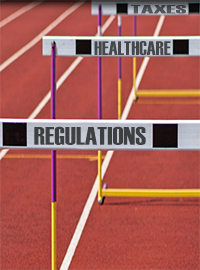| New Harvard Study: "A Troubling Divergence in the American Economy" |
 |
|
By Timothy H. Lee
Thursday, October 02 2014 |
What elements of American society boost our international competitiveness, and which ones weaken us? In the real world, what works in America and what doesn't? In our contemporary political climate, Americans of differing philosophies can argue until we're blue in the face about our various points of view. It reaches the point where our disagreements often more closely resemble fanatical sports loyalties or flashing of gang signs than they do enlightened, substantive debate. In such an environment, actual empirical studies and dispassionate surveys can provide much-needed objectivity amid the partisan cacophony. In that tenor, a new Harvard Business School release entitled "An Economy Doing Half Its Job: Findings of Harvard Business School's 2013-2014 Survey on U.S. Competitiveness" offers helpful perspective. Overall, the survey of approximately 2,000 graduates in the working world found "a troubling divergence in the American economy": "Our sense is that the American economy is doing only half its job is amplified by the recent business cycle, with its jobless, low-wage recovery. After the recession that began in late 2007, real gross domestic product recovered to pre-downturn levels in three and a half years, but it took three more years (until May 2014) for the number of jobs in America to return to its prior peak. During those six and a half years of net-zero job creation, the U.S. population grew by roughly 15 million. A recent report from the National Employment Law Project finds that jobs lost during the 2008-10 employment contraction were disproportionately in higher-wage industries such as construction and electronics manufacturing, while jobs gained during the recovery have concentrated in low-wage industries such as food service and nursing home care. Tellingly, all of the low-wage industries with job gains were local in character, not exposed to international competition." That would explain why public opinion surveys show persistent pessimism among the American public, even while President Obama assured us on CBS's "60 Minutes" this week that we're better off by almost every measure than we were six years ago. Remarkably, 72% of Americans in one recent survey state that we're still in recession even though the last recession officially ended over five years ago in June 2009. But what actually works for America, and what holds us back? The Harvard survey results won't surprise those who advocate less government, respect for property rights and greater freedom. What works: Institutions championed by conservatives and libertarians, including property rights, innovation, communications infrastructure and entrepreneurship. Those were among the factors that survey respondents labeled "Strengths" in comparison to other advanced world economies. What isn't working: Institutions championed by liberals, including government regulation, our K-12 education system, our tax code, current "macro policy" and our legal framework. Those are among the elements that respondents labeled "Weakness and Deteriorating" in comparison to other advanced economies. The theme here is obvious. The elements of American society holding us back tend to be those dominated by force of government and bureaucratic sclerosis, whereas the things that help sustain our competitiveness are those characterized by traditional values of individual freedom and private initiative. Our system of property rights, including intellectual property (IP) rights, is by many measures the world's strongest, and has led to the most creative and innovative culture in human history. It is thus no surprise that the American economy continues to stagnate, given an Obama Administration that has exceeded the bounds of legality in imposing more government, fewer property rights, higher taxes and tighter regulation. We now suffer the developed world's highest corporate tax rate, even while other nations continue to reduce theirs to attract businesses. In comparison, the American economy under Ronald Reagan quickly achieved escape velocity from an even deeper recession, after shifting toward less government, lower taxes and lighter regulation. Notably, the Harvard survey respondents listed our communications infrastructure as a "Strength but Deteriorating." America invented the Internet, which has revolutionized our lives over two decades in a manner unprecedented in human history. Currently, however, Obama's Federal Communications Commission (FCC) persists in pressing for greater regulation of the Internet and service providers, demanding a "fix" for something that isn't broken. The FCC has twice been slapped down by the nation's second-highest court for attempting to impose so-called "Net Neutrality," yet now seeks to regulate Internet service under laws created for rotary-dial telephone service. That is not the sort of federal behavior that will foster innovation into the 21st century. To finally emerge from the last recession in a meaningful way, America must emphasize property rights, innovation, communications infrastructure investment and tax reform. The new Harvard survey serves to confirm that reality, but the question is whether the Obama Administration and Congressional leaders finally take heed. |
Related Articles : |
























